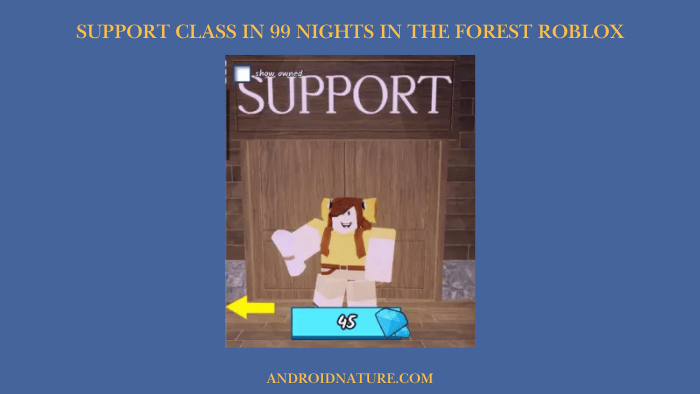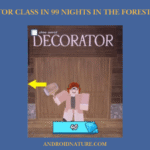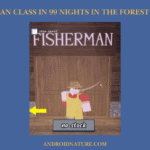The Support Class in 99 Nights in the Forest is built for teamwork. It’s one of the few classes that can actively link with another player and share survival stats like health, hunger, and even damage absorption.
While it may not be powerful in solo runs, its perks make it a vital ally in co-op sessions, especially when surviving longer nights or tough cultist attacks.
If you like playing a backbone role, keeping your team alive and thriving, this class will suit you perfectly.
Support Class in 99 Nights in the Forest : Overview
The Support Class can be unlocked for 45 Gems and starts with one Bandage as its basic tool.
What makes it stand out from other early-game classes is its unique bonding mechanic, where you form a connection with another player at the start of a run.
This bond allows both of you to share benefits: you’ll absorb some of their damage, boost each other’s strength when close, and later gain visibility of each other’s locations across the map.
It’s the perfect pick for duos or team play.
Support Class Perks
| Level | Perk | Effect |
|---|---|---|
| Level 1 | Player Bond | Bond with another player at the start of the game. You absorb part of their damage and deal more damage when near each other. |
| Level 2 | Shared Hunger System | Your bond partner consumes food for both of you (80/20 ratio), helping balance hunger drain between players. |
| Level 3 | Global Bond Tracking | You can always see your bonded partner’s beam marker, no matter where they are on the map. |
These perks make the Support class incredibly useful for players who prefer coordination over solo exploration.
How to Use the Support Class Effectively
To make the most of the Support Class, you’ll want to focus on coordination and resource balance. Here’s how to play it efficiently:
-
Form a Bond Early: The bond activates as soon as you join a lobby, so communicate with your teammate about roles before starting. It’s best to pair with an aggressive or tank class like Berserker, Brawler, or Base Defender.
-
Stay Within Range: Your damage bonus scales when you’re close to your bond partner. Keep proximity during combat or resource collection to maximize the perk’s potential.
-
Monitor Food Management: At Level 2, your partner’s food intake partially feeds you too. This helps if you’re low on supplies, but be sure to share extra food when possible.
-
Team Revives: Use your Bandage wisely — one well-timed heal can save a run. If possible, coordinate with a Medic player to double up on healing capabilities.
-
Late Game Advantage: Once you hit Level 3, your tracking ability becomes invaluable during chaotic nights or boss raids — you’ll always know where your bonded player is.
Pros of the Support Class
-
Excellent for co-op play and duos
-
Damage-sharing mechanic prevents sudden player deaths
-
Reduces hunger management stress
-
Global visibility of bonded partner helps coordinate better
Cons of the Support Class
-
Not useful for solo players
-
Requires strong communication and teamwork to be effective
-
Weak early-game combat stats
-
Limited healing tools — only one Bandage at start
Is the Support Class Worth It?
If you play 99 Nights in the Forest with friends or in multiplayer lobbies, absolutely yes.
The Support class is one of the best “synergy” roles — boosting survival, combat coordination, and resource efficiency all at once.
However, solo players should skip this class for now since its abilities depend entirely on others. It’s most effective when you’re part of a duo or small squad that plans ahead.
Trivia
-
The Support Class was introduced alongside the Medic and Decorator classes in the Classes Update.
-
It’s one of the only classes with a real-time tracking ability, visible through a beam that connects bonded players.
-
The bond can’t be manually broken — it remains active throughout the session.

As a seasoned DIY tinkerer, Arvind found the simplest way to help anyone troubleshoot or set up tech without feeling overwhelmed by it. He’s an advocate for smart home technology and in his free time makes music. He’s also an avid gamer, mostly obsessed with single-player titles.







